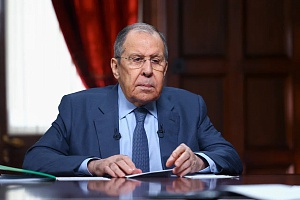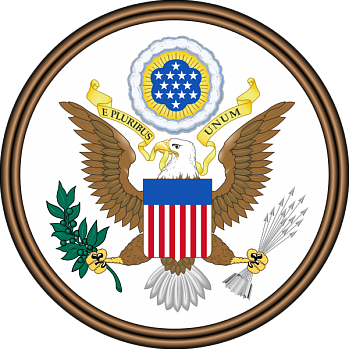 Соединенные Штаты Америки (США)
Соединенные Штаты Америки (США)
Foreign Minister Sergey Lavrov’s interview with Rossiya Segodnya, May 30, 2024
Question: American missiles can effectively target Russia’s strategic sites, including nuclear facilities, especially if the United States deploys intermediate and shorter-range missiles in Europe and the Asia-Pacific Region, thereby reducing their flight time. What additional steps can Moscow take in terms of nuclear deterrence in this case? Would a tit-for-tat response be sufficient?
Sergey Lavrov: You are absolutely right. Indeed, the deployment of US ground-launched intermediate and shorter-range missiles in these regions poses significant security challenges for Russia. By the way, this concern is shared by others as well. Following the recent visit by President Vladimir Putin to the People’s Republic of China, the two leaders issued a joint statement saying that by taking steps along these lines, the United States produces a destabilising effect and poses a direct threat to both Russia and China. Therefore, we agreed with our Chinese partners to work closer together in order to counter Washington’s irresponsible behaviour. Its actions undermine international stability.
We will not hesitate to respond if the Americans move forward with their plans to deploy their ground-launched intermediate and shorter-range missiles. In particular, Russia will have no choice but to terminate the self-imposed restrictions we assumed after the United States withdrew from the INF Treaty. We may also consider taking additional steps to strengthen our nuclear deterrence. After all, American forward-based missiles would have the capability to target command posts and nuclear deployment sites. It is up to the President of the Russian Federation to decide on these matters.
Question: Has Russia considered the option of stepping up joint military exercises with China as a way to respond to what the United States has been doing in the Asia-Pacific region?
Sergey Lavrov: We have established a high level of mutual trust with China, which serves as a foundation for our military cooperation. By working together, Russia and China seek to reinforce international security in keeping with international norms.
However, this commitment to aligning our efforts does not target any third countries. Together with our Chinese friends, we are forced to take into consideration the negative military and political trends in the Asia-Pacific region and take action to mitigate their adverse effects.
Russia and China both recognise the importance of stepping up our defence cooperation, both on a bilateral basis, and within multilateral frameworks, and the joint statement resulting from President Vladimir Putin’s visit to the People’s Republic of China sets forth this vision. Specifically, it involves conducting large-scale joint exercises and military training, patrolling the sea and airspace, and enhancing our joint response capabilities.
Question: Does Russia see any forces in Ukraine that it could discuss peace with now that Vladimir Zelensky’s term of office has expired? Do we have an understanding of when the special military operation might end?
Sergey Lavrov: The current ruling party in Kiev is the party of war, and their stated goal is to defeat Russia on the battlefield. It is difficult to imagine any peace talks taking place in that situation. In addition, a legal ban on talks with the Russian leadership was adopted in Ukraine on September 30, 2022.
Regarding Vladimir Zelensky’s legal status after May 20, when his term as president of Ukraine expired, President Vladimir Putin clearly stated our position at a news conference in Minsk on May 24.
Hopefully, the political forces that care for the interests of the people will sooner or later emerge in Ukraine. But for now, our only option is to continue with the special military operation until we attain its goals.
Question: Is it possible to accelerate the political settlement process in Ukraine?
Sergey Lavrov: Yes, theoretically. The necessary conditions are for the West to stop sending arms to Ukraine and for Kiev to cease hostilities. The sooner this happens, the sooner the political settlement process can begin.
We said on numerous occasions, including at the highest level, that Russia remains open to negotiations. However, it should be clear to everyone that we will only discuss peace, not a ceasefire. There is no reason to give the opponent a pause that they could use to regroup and rearm. Negotiations must be based on the principle of indivisible security and on the realities on the ground.
Question: Does it make sense for Russia to continue to cooperate with the OSCE in light of its pro-Ukraine stance?
Sergey Lavrov: There is no denying that the OSCE is in a deep crisis. It has been caused by the fact that the West has trampled on the principles the organisation was built on. A total “Ukrainisation” of its agenda has practically brought to naught its activities in the traditional fields, namely, military-political, economic, environmental and humanitarian affairs.
It appears that the only reason for Russia’s continued membership in the OSCE is the opportunity to directly communicate our stand on the current issues to the other 56 member states, including those Western countries that have suspended dialogue with us in other formats. Additionally, the OSCE’s consensus rule allows us to block the initiatives of unfriendly countries that do not align with Russia’s interests.
Question: According to reports, Ukraine will soon have F-16 fighter jets supplied by certain NATO countries. The Russian Foreign Ministry has indicated that Moscow would view these aircraft as potential carriers of nuclear weapons. What will be our reaction when aircraft of this type are integrated into the Armed Forces of Ukraine?
Sergey Lavrov: Supplying the Kiev regime with increasingly destructive types of weapons shows that the West is not interested in ending the conflict.
The F-16 American fighters will not change the situation on the line of contact. These aircraft will be destroyed just like any other type of weapons supplied by NATO countries to Ukraine.
At the same time, it is important to bear in mind that F-16 fighters have long been used as the main vehicle in NATO’s so-called joint nuclear missions. Therefore, we can only consider the decision to supply these systems to the Kiev regime as a deliberate signal from NATO concerning nuclear weapons. They are trying to tell us that the United States and NATO are ready to use literally anything in Ukraine.
Nevertheless, we hope that the joint tactical exercise Russia and Belarus are now holding to practice the use of non-strategic nuclear weapons will help our opponents see reason and remind them of the disastrous consequences of further ratcheting up nuclear tensions.
Question: What is your assessment of Washington’s statement regarding the possibility of discontinuing the shipments of certain weapons to Tel Aviv in light of the Israeli operation in Rafah? Why did the United States not react in a similar way after the shelling of Russian cities by the Armed Forces of Ukraine?
Sergey Lavrov: From our experience with the Americans, it is perfectly clear that US statements are not to be trusted. We wanted to believe them for a long time; we tried to negotiate, and concluded agreements with them. However, it later turned out that Washington was never going to make good on its promises, including those they actually signed off on paper or those sealed in UN Security Council resolutions.
The Americans continue to make declarations about their commitment to a just solution to the Palestine problem, while at the same time generously adding fuel to the armed confrontation. For six months, Washington has blocked the UN Security Council’s ceasefire decision, effectively green-lighting the devastation of the Gaza Strip. However, when the Americans had to abstain from voting in March, and the Security Council finally approved a resolution calling for a cessation of hostilities, the US representative said without a shadow of embarrassment that the document was not binding.
Washington’s announcement that it was suspending the supply of ammunition to Israel was limited to one type of ammunition, aerial bombs, and only one batch as part of the “near term security assistance.” A few days later, the US House of Representatives approved a bill to lift the “pause” in the supply of weapons to Israel. If the Republican-sponsored bill passes the Senate, it will not allow the White House to withhold military aid to Tel Aviv.
As for the second part of your question, the answer to that is quite obvious. Russia is referred to as an imminent threat in the US National Security Strategy. The United States and NATO openly say that their goal is to inflict a “strategic defeat” on our country. In this context, the fate of the civilian population in Russian cities is of no interest to the White House, which has become complicit in the crimes of the Kiev regime.
Question: President of the People’s Republic of China Xi Jinping has said that Beijing will support a peace conference recognised by Russia and Ukraine. What is Moscow’s stance on Beijing’s approach to the Ukraine crisis? Will Moscow support Beijing’s potential proposal on holding a peace conference on Ukraine? What issues should its participants discuss?
Sergey Lavrov: We appreciate Beijing’s constructive approach to the Ukraine crisis. Our Chinese friends understand its root causes and the essence of the current developments. In February 2023, they presented a plan to resolve the conflict. In April, President of China Xi Jinping called for de-escalation in order to establish peace and promote stability, rather than exacerbating the situation and being guided solely by one’s own mercenary interests. We hope that the West and Kiev will draw the right conclusions.
Regarding the idea of convening an international peace conference in a timely manner (which would ensure the equal participation of Russia and Ukraine, as well as the discussion of all available peace initiatives), we view this as Beijing’s continued efforts to create favourable conditions for resolving the Ukraine crisis. We share its standpoint that it is crucial, first and foremost, to address the root causes and protect the legitimate interests of all parties. We should then work towards subsequent agreements based on the principle of equal and indivisible security. I would like to emphasise once again that this calls for respecting the realities that have taken shape on the ground and which reflect the will of the people living there.








